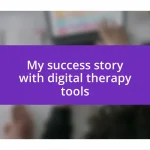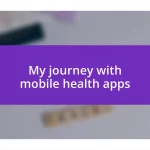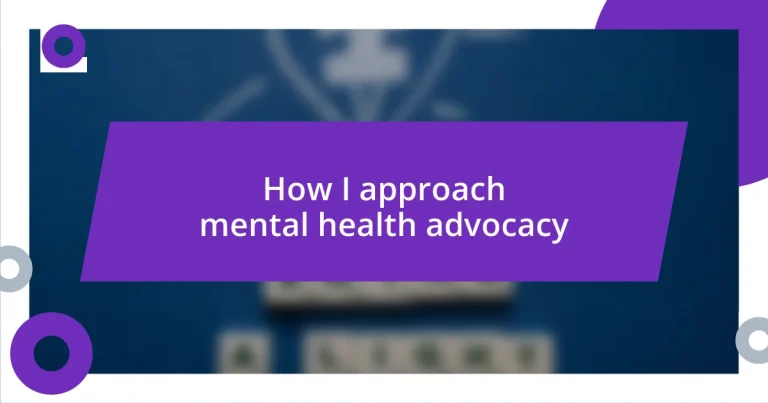Key takeaways:
- Mental health advocacy is vital for amplifying voices and promoting understanding, allowing individuals to feel safer in discussing their struggles.
- Recognizing the signs of mental health issues—such as mood changes, social withdrawal, and decreased performance—is crucial for providing support to oneself and loved ones.
- Leveraging social media and collaborating with mental health organizations expands the reach of advocacy efforts, fostering community, education, and connection.
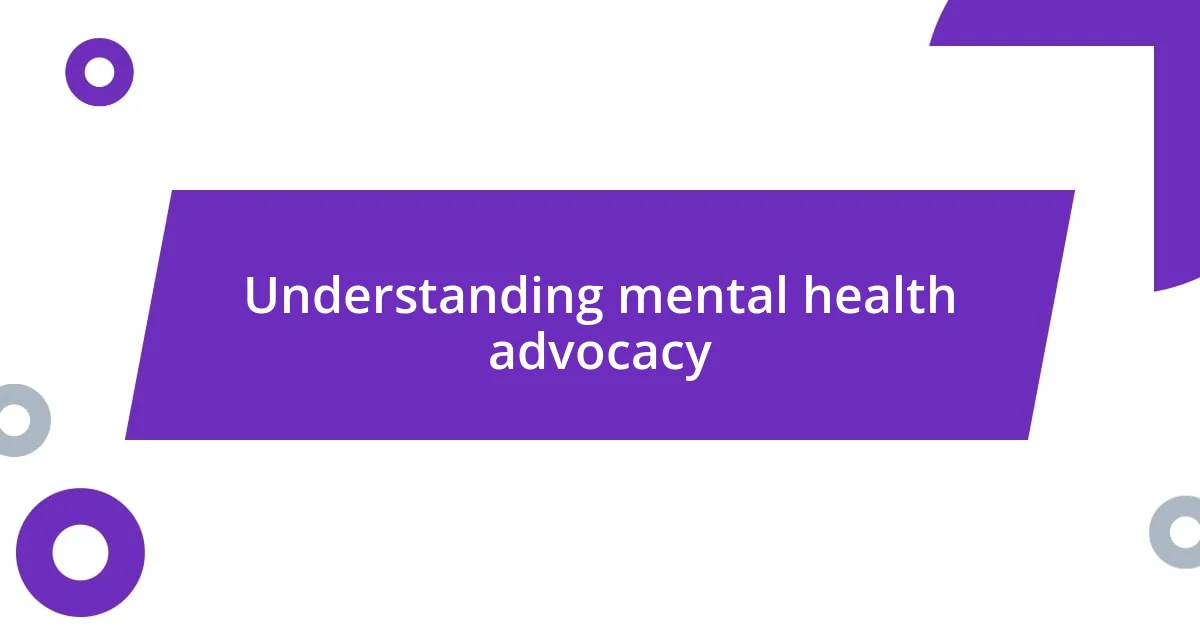
Understanding mental health advocacy
Mental health advocacy is about amplifying voices and championing the rights of those who struggle with mental health challenges. I remember attending a local mental health awareness event and feeling such a sense of purpose in sharing my own experiences to help others understand that they’re not alone. It struck me then—how often do we overlook the power of personal stories in advocacy?
When I talk about mental health advocacy, it’s not just a buzzword to me; it’s a lifeline. I once met a young woman who shared how feeling isolated due to her anxiety was compounded by the stigma surrounding it. It made me wonder: how can we create a world where everyone feels safe to speak up about their struggles? This realization drives my passion for promoting understanding and empathy around mental health issues.
At its core, mental health advocacy seeks to bridge the gap between awareness and action. I’ve often found myself reflecting on the incredible potential for change when people come together to educate themselves and others. Have you ever considered how a simple conversation can spark monumental shifts in perception? That’s the beauty of advocacy—it empowers each of us to contribute to a healthier dialogue surrounding mental health.
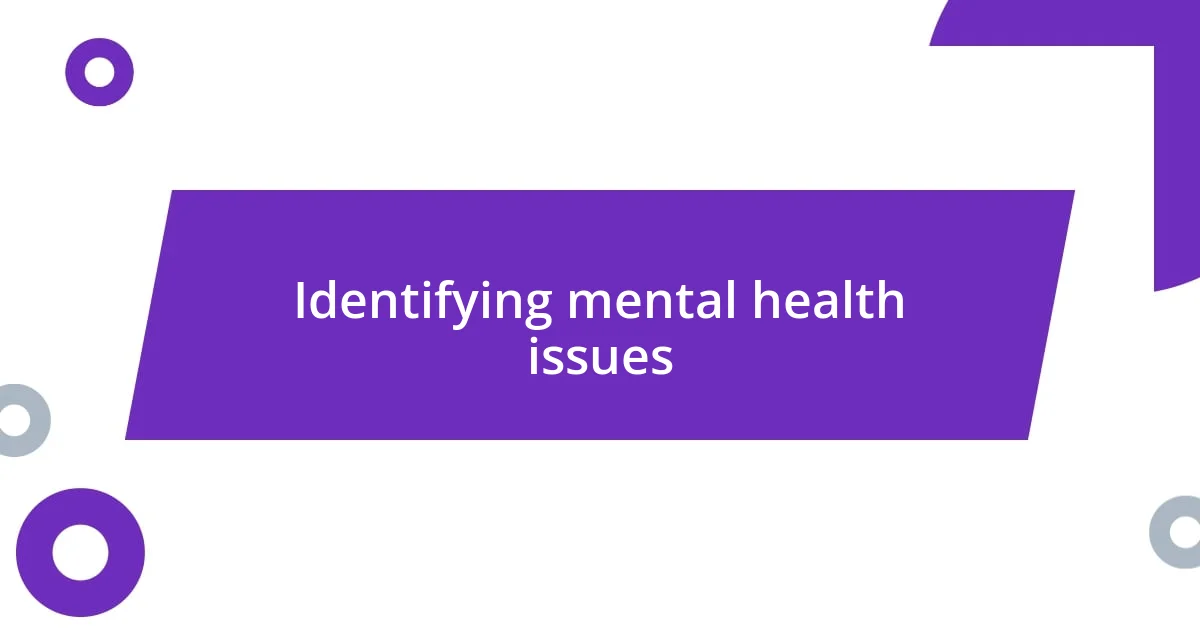
Identifying mental health issues
Recognizing mental health issues can sometimes feel like deciphering a complex puzzle. I remember a time when my close friend seemed off—she was more withdrawn and often expressed feelings of hopelessness. At first, I thought it was just a phase, but it quickly became apparent that she was struggling with depression. That experience taught me the importance of understanding the signs and symptoms that can often go unnoticed.
Here are some common indicators that might help identify mental health issues:
– Changes in mood: Noticeable swings in emotions, such as irritability or overwhelming sadness.
– Social withdrawal: Isolating oneself from friends and family.
– Changes in sleeping or eating habits: Oversleeping or insomnia, along with significant weight gain or loss.
– Decreased performance: Struggling with daily tasks at work or school.
– Substance use: Increased reliance on alcohol, drugs, or other substances as a coping mechanism.
– Physical symptoms: Unexplained aches and pains, which often accompany mental health struggles.
It’s crucial to stay attuned to these signs, not just for ourselves, but for our loved ones. I’ve realized that often, a simple check-in or open conversation can create a safe space for those facing mental health challenges to open up. This connection can make all the difference in someone’s journey toward healing.
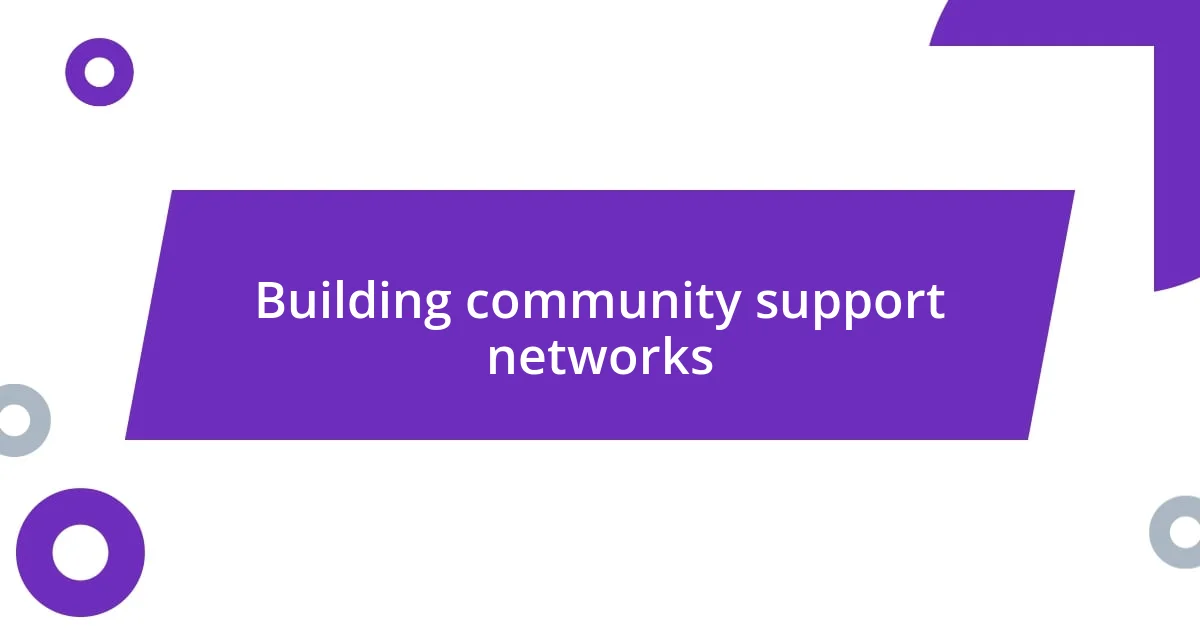
Building community support networks
Building community support networks is essential for mental health advocacy. I remember a group I joined where members shared their experiences and resources about mental wellness. The sense of belonging was palpable; it was heartening to know I wasn’t facing my struggles alone. This collective spirit fosters resilience, making it easier for individuals to navigate their mental health journeys.
Creating these networks involves not just gathering individuals, but also cultivating genuine connections that empower each member. Recently, I reached out to a local mental health charity to volunteer. They invited me to participate in workshops designed to educate the public about mental health. Through this experience, I witnessed how community support transforms the atmosphere, allowing participants to speak freely about their challenges. When we share our stories, we inadvertently become advocates for one another, strengthening the fabric of our community.
In my experience, the most meaningful networks stem from shared interests or challenges. I once attended a small support group for those coping with anxiety. It was amazing to see how we all resonated with each other’s struggles and triumphs. That shared understanding fostered an environment of trust. Such connections often lead to friendships beyond the initial intent, creating long-lasting support networks that empower individuals to thrive.
| Support Network Type | Benefits |
|---|---|
| Peer Support Groups | Fosters shared experiences and understanding. |
| Online Communities | Provides anonymity and accessibility for discussions. |
| Professional Workshops | Educates and equips members with coping strategies. |
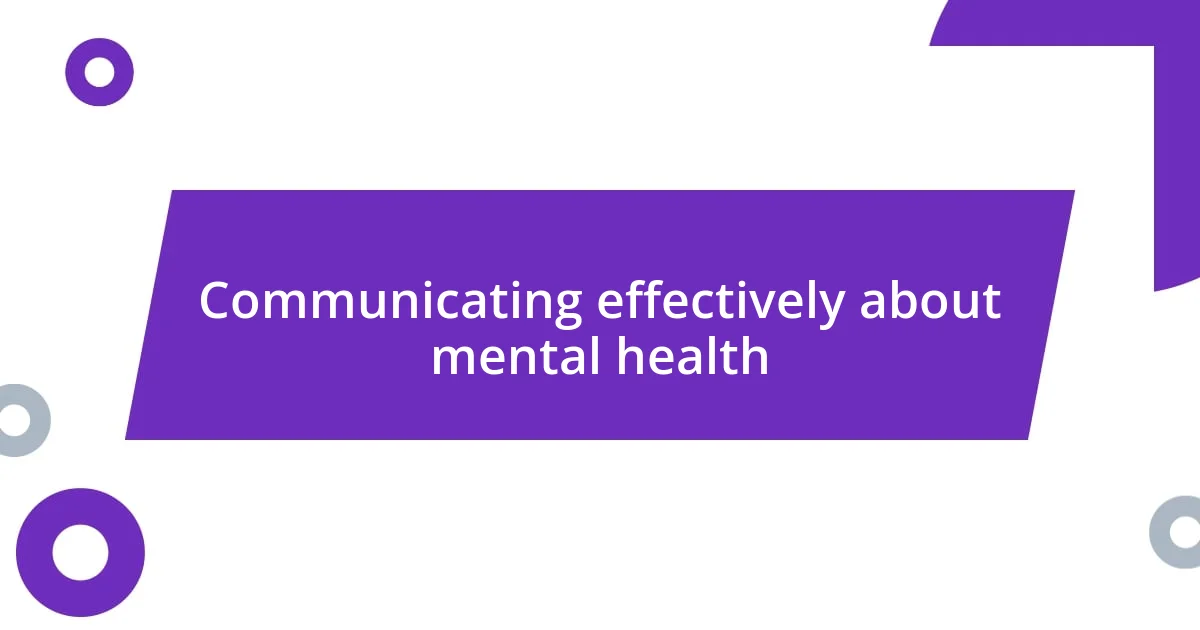
Communicating effectively about mental health
Effective communication about mental health requires sensitivity and openness. I once had a conversation with a family member who was struggling with anxiety. Instead of jumping straight into advice mode, I simply asked how they were feeling and really listened. That moment taught me the value of providing a space where individuals feel safe to express their emotions.
It’s essential to use clear and relatable language when discussing mental health. I remember attending a workshop where the facilitator emphasized avoiding jargon. Terms like “cognitive therapy” can sound intimidating. Instead, framing it as “talking your way through challenges” can be much more inviting. How often do we complicate well-meaning messages because we overthink our choice of words?
Connecting on a personal level makes a huge difference in how we discuss mental health. I try to share my own experiences because it fosters relatability. For example, discussing a time when I felt overwhelmed can prompt others to open up about their struggles. Have you ever noticed how sharing vulnerability creates a powerful bond? It’s like turning the lights on in a dim room, illuminating a path toward understanding and healing.
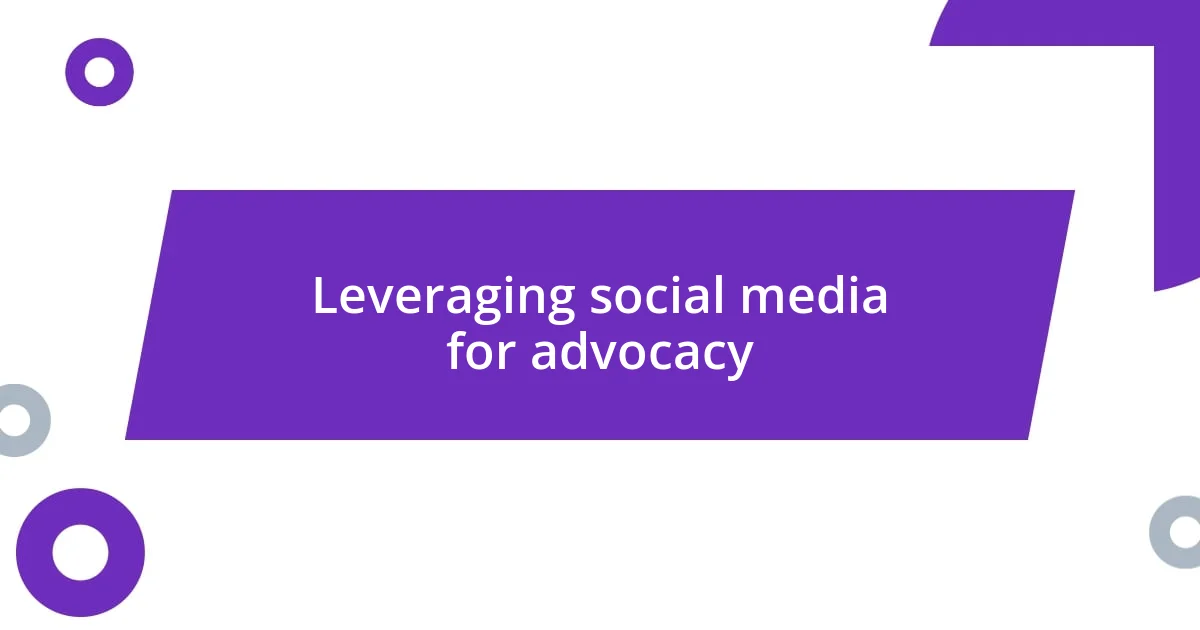
Leveraging social media for advocacy
Leveraging social media for mental health advocacy is a powerful tool, enabling voices to be heard on a larger scale than ever before. I vividly recall the day I posted about my own mental health journey on Instagram. The response was overwhelming; people I hadn’t spoken to in years reached out, sharing their stories and thanking me for normalizing the conversation. This spontaneous exchange reminded me that visibility can foster connection.
Social media platforms also allow for immediate engagement and outreach. I often participate in Twitter chats dedicated to mental health topics, sharing insights and resources. The camaraderie I feel through those discussions is invigorating, as it creates a community where everyone is striving for better mental wellness together. Have you ever turned a casual scroll into a meaningful dialogue? I’ve seen firsthand how a single tweet can spark a conversation that changes someone’s perspective on their mental health.
Moreover, using hashtags strategically can dramatically widen the reach of our message. When I joined the #MentalHealthAwareness hashtag movement, I was surprised by the diverse experiences people shared globally. This collective storytelling not only educates but also empowers folks who may feel isolated. It strikes me that each post has the potential to inspire someone to seek help or simply feel less alone. Isn’t it remarkable how a simple click can lead to profound connections?
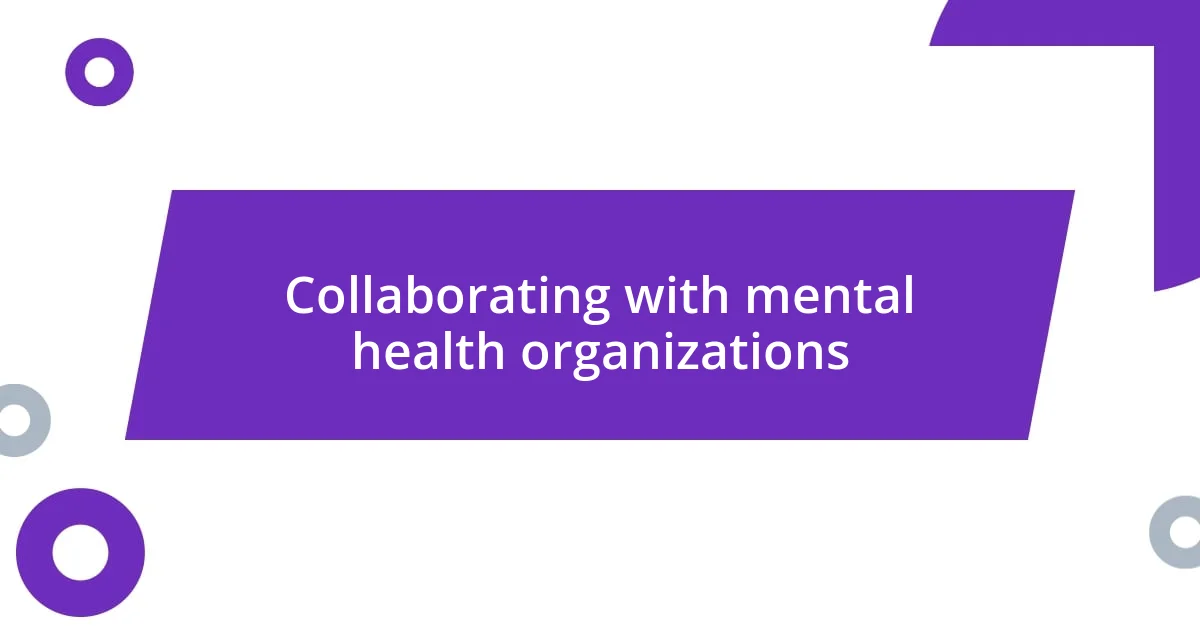
Collaborating with mental health organizations
Collaborating with mental health organizations enhances the impact of advocacy efforts. I remember volunteering with a local mental health nonprofit, where I contributed to organizing community events. Seeing how dedicated professionals and volunteers came together to raise awareness really inspired me. Have you ever been part of something that made you feel you were contributing to a larger purpose? That feeling is unmatched.
Partnering with these organizations can also provide valuable resources and expertise. For instance, during a community seminar, I learned about various mental health programs available in our area that I had never considered. This knowledge not only broadened my understanding but also equipped me to share more comprehensive information with others. Why limit our advocacy to just personal stories when we can leverage the wealth of resources that these organizations offer?
Moreover, collaborating opens the door for innovative initiatives. I had the opportunity to co-create a social media campaign with a mental health group, aimed at destigmatizing conversations around mental health. Each brainstorming session felt electric, as we exchanged ideas and personal experiences, ultimately crafting messages that resonated with a wider audience. Isn’t it amazing how teamwork can amplify our voices and bring about meaningful change?





